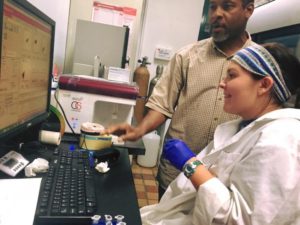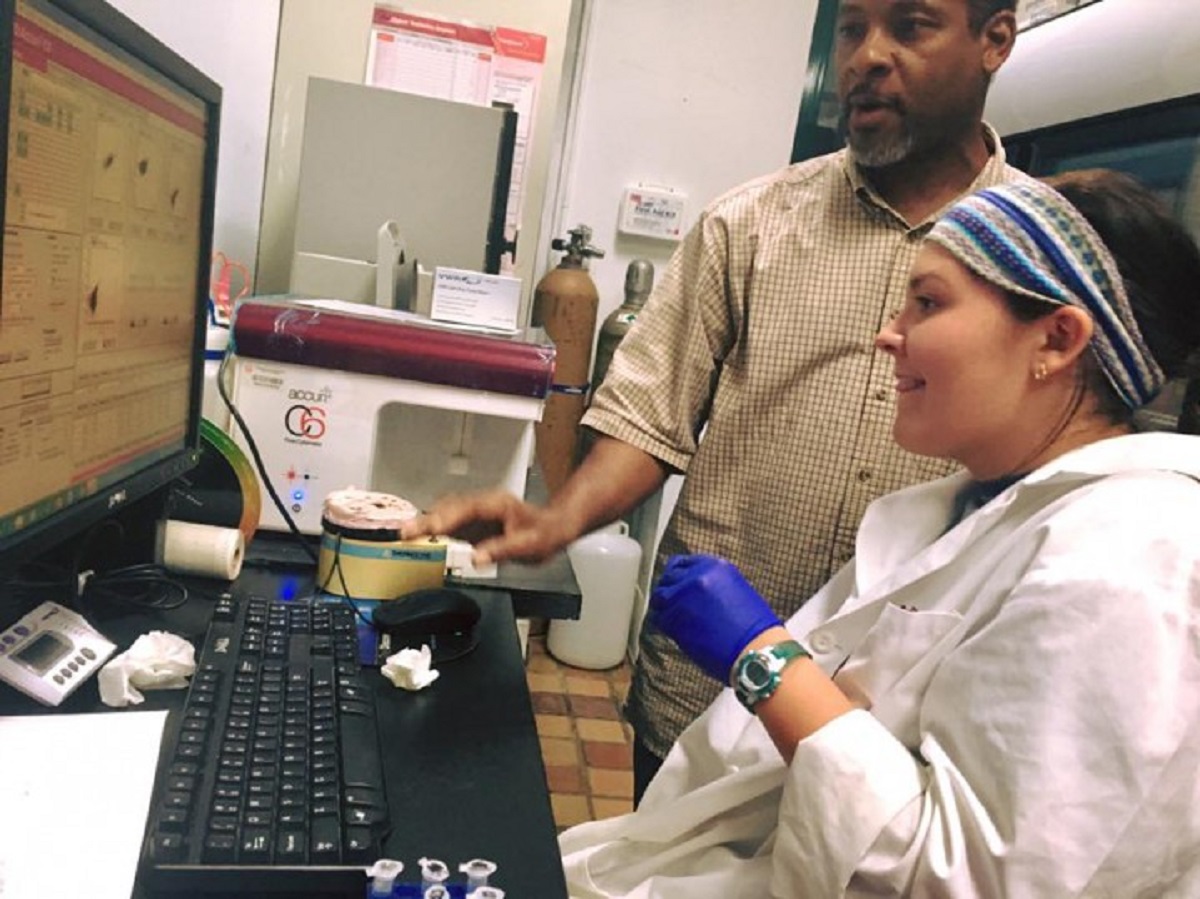Six MC Students Receive Ledford Scholarships

Six Maryville College students have been granted a total of more than $36,455 through the Appalachian College Association’s (ACA) Ledford Scholarship to fund summer research projects.
Named for Colonel Lee B. Ledford, the scholarship program offers financial assistance for students who are enrolled at ACA member institutions and conducting summer research in the fields of laboratory and field work, interviews, analyzing special collections and participant observation.
Five of the six recipients will utilize the money to fund research associated with their Senior Study project.
“Undergraduate research has been a distinctive feature of the Maryville College curriculum since 1947, when a two-semester, faculty-supervised independent study was made a graduation requirement of all students,” said Dr. Barbara Wells, vice president and dean of the College. “And this year’s number of successful Ledford Scholarship applicants speaks to the high value we place on this type of scholarly work. These students are well-prepared for what are more typically graduate-level research experiences.”
A total of 30 students enrolled at 11 ACA institutions were awarded scholarships.
The Ledford Scholarship provides stipends for students at a rate of $8.50/hour ($5,120 max) and an allotment of $1,000 for equipment and travel.
The students will present the outcomes of their research this fall at the annual ACA Summit.
“Each student will be working closely with a faculty mentor this summer,” Wells added. “This arrangement will enable them to continue to develop their research skills. We know from experience that opportunities like these can give students a distinct advantage when they apply for admission to graduate school or health sciences programs.”
With the help of a $6,100 Ledford Scholarship, biology major Valerie Whitehead ’18 will continue studying the population of eastern box turtles in the Maryville College Woods—a project she began in May 2016.
Through her research, she will determine the population size, sex ratios, home range size, habitat preference and seasonal activity of these turtles in the Maryville College Woods through weekly GPS monitoring.
She became interested in the opportunity when she approached Dr. Dave Unger, MC associate professor of biology, about potential topics for her Senior Study.
“I went to Dr. Unger about the possibility of tracking coyotes in Alcoa, TN,” said Whitehead, who is from Maryville, Tenn. “He said that idea was logistically impossible, but, if I was willing to scale down, he had a box turtle project coming up. He said no one had shown interest until I asked. I was ecstatic to do it.
“I was in his ecology class at the time, and we spent two lab days searching for, processing and putting transmitters on turtles,” she added. “I thought, ‘how cool would it be to get to see what these guys do when we aren’t looking?’”
In addition to Unger’s advice, Whitehead said she was inspired by a similar Senior Study project conducted by Thomas Moore ’16. Moore, who received two Ledford Awards during his time at MC, traveled to Cumberland Island National Seashore in Georgia to research the population dynamics of gopher turtles on the island.
Whitehead is scheduled to finish the project in October 2017.
Chemistry major Megan Lewis ’18 and biochemistry major Giovani Gutierrez ’18 received $6,120 Ledford Awards to pursue research at the Hollings Marine Laboratory (HML) in Charleston, S.C. Both students will work alongside the staff at HML and receive additional guidance from Dr. Nathan Duncan, assistant professor of chemistry at MC, who is conducting his own research at the facility.
Duncan previously visited HML last summer and was able to create opportunities for Maryville College students to utilize their facilities for Senior Study research.
Though Lewis has spent two months during this semester on her project, she will work alongside a post-doctoral student and the staff at HML for three months this summer.
Lewis will be studying metabolomics, which is the field of science that studies the compounds different organisms form during metabolism called metabolites. In order to do this, she will utilize Nuclear Magnetic Resonance (NMR), a specific type of spectroscopy that uses the magnetic properties of certain atomic nuclei in order to determine the physical and chemical properties of molecules and atoms. She will use this technology to focus mostly on subjects that are beneficial to the determination of overall environmental health.
“After taking organic chemistry as a sophomore, I became really interested in a specific type of spectroscopy called NMR,” said Lewis, who is from Powell, Tenn. “The opportunity at HML was perfect for me, as I will be able to work with an instrument that is a much higher caliber than anything at MC.”
Several MC alumni and current professors encouraged Lewis to apply for the Ledford Award, which made her research a possibility.
Gutierrez’s research will focus on studying peptides and proteins of predatory venomous mollusks belonging to the genus Conus, or Cone snails.
“The research will incorporate an assortment of bioanalytical techniques to classify and characterize unknown conopeptides, the main component of the cone snail venom,” said Gutierrez, who is from Maryville, Tenn. “The venom has shown properties in treating chronic pain and other various forms of pain.”
He will work alongside the Marine Biochemical Sciences Team led by Dr. Frank Mari at HML and will receive additional guidance from Duncan.
Megan Burnham ’19, a biochemistry major from Thorn Hill, Tenn., is scheduled to travel this summer to the Medical University of South Carolina (MUSC) in Charleston, S.C., to study under Dr. Robin Muise-Helmericks, associate professor of molecular mechanisms of angiogenesis and wound repair. She received a $6,120 Ledford Award and will conduct her research from May 31 through July 2 and again from July 16 through Aug. 15.
“The research in which I will be partaking is a continuation of Muise-Helmerick’s research at MUSC,” Burnham said. “We are researching the antimicrobial and scar-reducing potential of poly-N-acetyl glucosamine nanofibers on cutaneous wounds. Muise-Helmericks will be my supervisor, and the research will be conducted in her Department of Regenerative Therapy lab at MUSC.”
Burnham, who desires to become a dermatologist, discovered the project when she began asking her advisors for Senior Study opportunities that would allow her to experience this field. Burnham’s older sister, Elizabeth Burnham ‘16, received a Ledford scholarship in 2016 to determine the antioxidant potential of English Ivy extracts. Because of this, Burnham was familiar with the process and chose to pursue the award to fund her own research.
Cara Coleman ’18, a biochemistry major from Maryville, Tenn., also received a $6,120 Ledford Award to fund her research at MUSC. Coleman will be studying cancer immunotherapy, a field that involves using the body’s natural immune system to fight cancer.
“I will be working with an MC alumna, Ravyn Thompson ‘15, on her project at MUSC over the summer,” Coleman said. “Immunotherapy is an up-and-coming area of cancer treatment that has very promising data supporting it already, but there are still a lot of issues to figure out. We are going to be studying how our natural T cells (which are capable of killing cancer cells) convert into regulatory T cells (which suppress the immune system and do not kill cancer cells) when in the presence of Multiple Myeloma cancer cells.”
Coleman said she was not familiar with the concept of immunotherapy until Duncan asked her to partake in the project but became quite interested as she began her preparatory research.
“It is such a new field and so exciting for the future of cancer treatment,” Coleman said. “I feel very fortunate to be a small part of this work.”
Coleman is currently conducting preliminary research using cell cultures and bioluminescence—work that will not only prepare her for her summer research but will also be included in the written portion of her Senior Study.
Biology Major Victoria Deal ’19, who is from Huntsville, Ala., received her second Ledford Award to continue the research she and Morgan Gast ’19 began nearly a year ago. The $5,875 Ledford Award Deal received this year will allow her to travel back to the University of Puerto Rico (UPR)-Río Piedras alongside Dr. Angelia Gibson, MC associate professor of chemistry and the students’ advisor for the project.
The two students worked on the project during the summer of 2016, into the fall 2016 semester and traveled to UPR in December to work in the laboratory of Dr. A. Valance Washington, which studies platelets.
While in the lab on campus last summer, the students were attempting to piece together an antibody that would hopefully bind to TLT-1, a protein that is produced by platelets, and block it. Researchers originally thought the protein’s main role was to help platelets stick together during the formation of blood clots but now believe it affects the activity of other cell types at wound sites and blood clots. By blocking the TLT-1 protein or by putting florescent tags on the attached antibody, researchers can better track the protein and understand its role in clotting processes.
In scientific terms, the goal of Gast’s and Deal’s research was to convert a partial antibody (known as a single-chain fragment of scFv) to a fully human immunoglobulin G by splicing the genes for the variable heavy and light chains from the TLT-1 scFv to the genes encoding the human IgG1 constant heavy and light chains, respectively.
The students had a breakthrough when, on Oct. 15, the students texted their professor a photo of a gel that showed the last pieces of the antibody assembled – evidence that they likely had the clone. After purification and sequencing processes were completed, Gibson and her students knew for sure that they were successful.
This summer, Deal will utilize the Ledford Award to travel to Puerto Rico to optimize expression of and then characterize the recombinant TLT-1 antibody she helped create. She will work on the project for about 10 weeks this summer and then as needed throughout the school year.
“Working under Gibson and Washington, I will learn the proper methods for transfecting mammalian cells such as Chinese Hamster Ovary (CHO) cells and optimizing expression of the antibody,” Deal said. “I will then learn how to test for antibody expression and binding to purified TLT-1 samples and proteins in the lysates of activated platelets through Western blots. I will also test to determine if the antibody binds to platelets using flow cytometry and test its effects on platelet aggregation using aggregometry.”
Deal learned the basics of flow cytometry and how to perform Western blots (a technique used to detect the presence of a specific protein) during her December trip to UPR.
Though neither she nor Gast had finished their freshman year when Gibson approached them about the project, the professor had gotten to know their interests and abilities well through their participation in the Scots Science Scholars program.
“I thought that the research would be an excellent learning opportunity as I would get to know more about life working in a research setting and learn more advanced laboratory techniques,” said Deal, who is considering veterinary school or a graduate program in biology after finishing her bachelor’s degree.
The end goal of the project is to assist in the preparation of an article for a peer-reviewed scientific journal, which they hope to submit in the fall of 2017.

